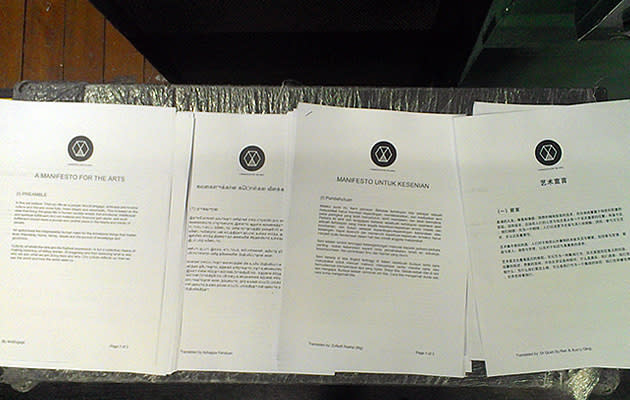Arts community rallies around manifesto questioning the place of arts in S’pore

A six-point arts manifesto emphasising the fundamentality of arts in society has received the support of top theatre practitioners, their companies and even a politician.
Nominated Member of Parliament Janice Koh was among 16 signatories attached to the manifesto from Singapore arts community group ArtsEngage. The manifesto was launched last week on petition website Change.org.
In a press conference Thursday, signatories from the arts community highlighted several points raised in the manifesto: that art can be challenged but not censored, and that art is political and “should inform all aspects of policy and politics that affect our lives”.
T. Sasitharan, co-founder of the Intercultural Theatre Institute, said that recent cases of “Sticker Lady” Samantha Lo and Sex.Violence.FamilyValues director Ken Kwek warrant a rethink of the intent of art. Lo and her male accomplice pled guilty to several counts of mischief in court last week but her sentence will only be known next month while Kwek's movie was initially banned before securing an R-21 release.
Sasi, as he is called in the arts scene, said, “Can you question the status quo without being political, at least by implication? If it happens to be political and it happens to be art, then it’s fine. The question is, does it have artistic merit? Those are the things we need to ask.”
Touching on the legitimacy of Samantha Lo’s graffiti as art, Sasi lashed out, “We are not going to have politicians, bureaucrats, (and) technocrats tell us what is or what is not art. That is not to say art is not contestable, but we do that as a community. It is not a diktat that comes down from the leaders.”
The annotated version of the manifesto says that elements of the arts should be a part of the national conversation.
“Discussions now have been primarily economic, and we need to include aspects of culture and society. We see the manifesto as part of a wider vision of nationhood, identity and society for the future,” the annotations denote.
Danger of arts being defined by power
The manifesto, released in Singapore’s four official languages, also stresses that art is fundamental. An annotation stresses that an artistic education is “not secondary or tertiary but primary”.
“The 21st century skills are being identified now and they all point to the re-humanising of human beings, which the arts engages in critically and fundamentally, not just as a by-product,” an annotation states.
The manifesto also stresses that art should not be defined by others, and that it has no set of rules for something to be defined as art.
“This is not so problematic if we were in a liberal society, but in a non-liberal society, there’s a danger that arts is defined by power and this is what we are trying to avoid,” an annotation explains.
According to Tan Tarn How, playwright and senior research fellow at the Institute of Policy Studies (Singapore), talks to put out the manifesto started last year, buoyed by several arts practitioners wanting to contribute to the ongoing national conversation exercise. The manifesto is the product of discussions and two meetings this February, including a townhall.
“(The manifesto) is not an ideological statement. It is a statement about the place of the arts in Singapore. It is about people – not just artists – reclaiming the arts for themselves and try to work out what it means and live with the arts as citizens of Singapore,” said Sasi.
Filmmaker Jasmine Ng expressed hopes that the manifesto will be adopted by arts groups, practitioners and journalists as a reference point for censorship, funding and the role of arts in life. She hopes the six points will guide artists in their next projects.
Organisations such as The Theatre Practice and The Necessary Stage have also endorsed the manifesto. Notice was given to arts groups Wednesday to endorse the paper. ArtsEngage invites non-related institutions to lend their endorsement as well.
Other signatories include Chew Keng Chuan, chairman of arts hub The Substation, as well as Tay Tong, director of Arts Network Asia. The 16 signatories on the manifesto did so in their own individual capacity and not in an institutional capacity.


